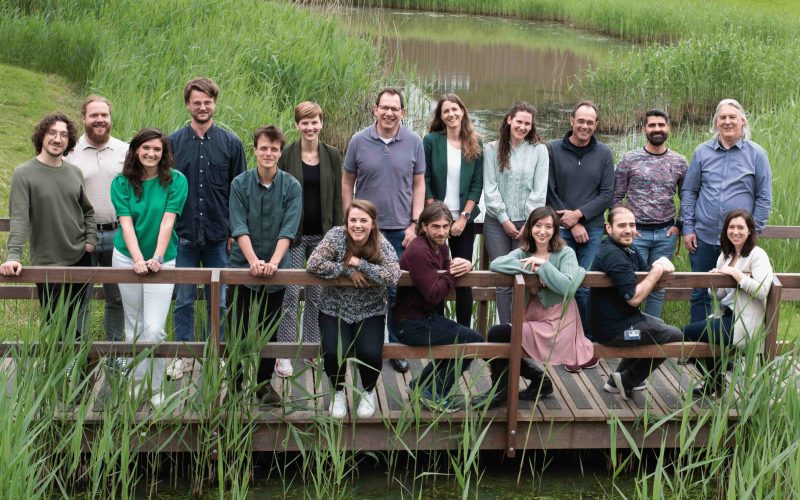In the world of modern research, innovation rarely occurs in isolation. In this series, we highlight a new research team each month, talking about how teamwork is essential for making their science work. This month in the spotlight: Team Utrecht-BCI.
During the Research Days last October, the annual UMC Utrecht Team Science Award was awarded to team Neo-BRAIN. However, Team Science thrives across many other research teams at UMC Utrecht. Here, Team Utrecht-BCI tells how teamwork helps to restore communication for people with severe paralysis with Brain-Computer Interface (BCI) technology.
The Utrecht-BCI Lab specializes in developing innovative solutions that use brain signals to control a computer. With these innovations they enable communication and societal participation for people with severe paralysis who have no other means to do so. Their approach stands out in the field of BCI research, as they prioritize real-world, everyday settings to validate their technology.
“Our work is deeply user-centered, focusing on practical applications that directly impact patients,” explains Nick Ramsey (professor cognitive neuroscience). With a strong commitment to collaboration, diversity, and innovation, the Utrecht-BCI Lab continues to push the boundaries of what is possible in neuroscience and assistive technology.
“Collaboration is essential in our work,” tells Mariska van Steensel (associate professor). “We are developing solutions that require not only technical expertise but also a deep understanding of patient needs, regulatory frameworks, and long-term usability. Our ability to integrate these perspectives is what makes our research impactful.”
“The Utrecht-BCI Lab thrives on the interdisciplinary expertise of our members,” adds Julia Berezutskaya (assistant professor). “Our backgrounds range from neuroscience and psychology to biomedical engineering and ethics. Which allows us to address every aspect of BCI research, from hardware and software development to ethical considerations.”
An exceptional aspect of the Utrecht-BCI Lab is the long-standing collaboration within the core team. “Six of us have worked together for more than ten years, which is unique in the world of (medical) science where most jobs are temporary, and knowledge is easily lost due to lack of continuity. Our collaboration is characterized by open communication, mutual respect, and shared accountability,” tells Mariana Branco (assistant professor).
“One of our biggest milestones is the first-ever worldwide implementation of a fully implanted BCI, restoring communication for an individual with late-stage ALS. This groundbreaking work was published in The New England Journal of Medicine and has since been more than 500 times. The study also gained significant national and international media attention, ranking among the top 5% in Altmetric impact.”
Building on this success, the team published a follow-up article in 2024. They demonstrated the long-term (7 years) usability of the technology while providing critical insights into the challenges of BCI longevity — an often-overlooked aspect in the field.
“Beyond scientific publications, we helped establish the BCI Society, an international platform that fosters collaboration in the field of BCI research. Additionally, we established the Utrecht Neurotechnology Connection, bringing together neurotechnology researchers within the UMC Utrecht.”
“Our team’s motto is “No grids, no glory”. The motto refers to electrode grid implants. These are placed directly at the surface of the brain to record and stimulate neurons, which is essential for our research. Implanting these electrode grids requires courage from patients as it is an invasive procedure. This motto reflects both the team’s scientific ambition and the courage of the patients participating in their studies.”
All our team members actively collaborate with international consortia, industry partners, hospitals, patient organizations, and regulatory bodies, contributing to the responsible development of neurotechnology. “Each team member contributes their expertise to the common goal of developing usable BCI technology,” tells Sifra Blok (project manager Utrecht-BCI). “All team members are recognized for their role in the different projects. The team spirit is enhanced by biweekly boardgame nights, group dinners and teambuilding activities to make sure everyone feels included and to stimulate a healthy work-life balance.”
Take a look at the research page of team Utrecht-BCI or their external website.
Read this article about Team LOTX.
Read this article about the winner of the 2024 Team Science Award, team Neo-BRAIN.
